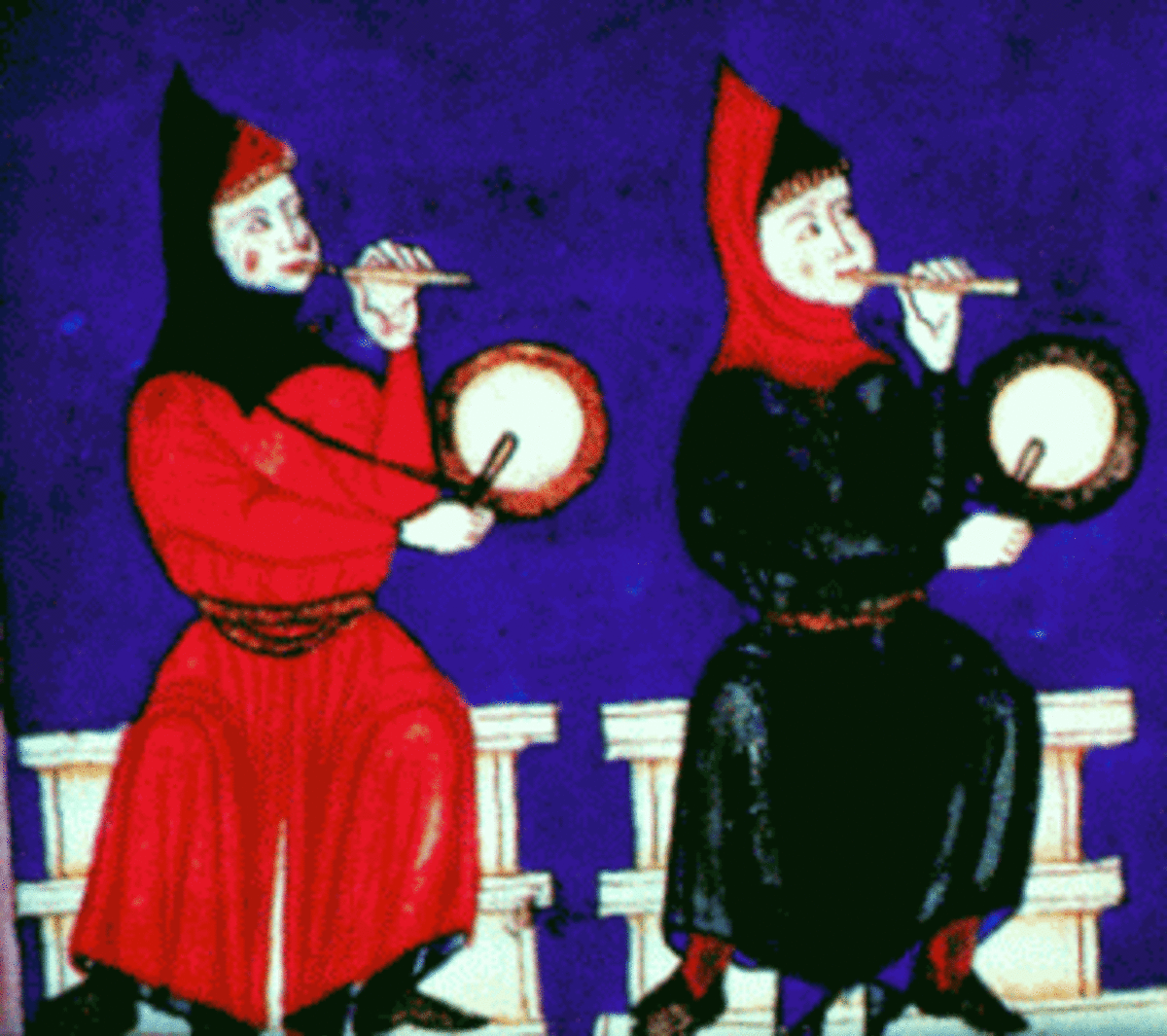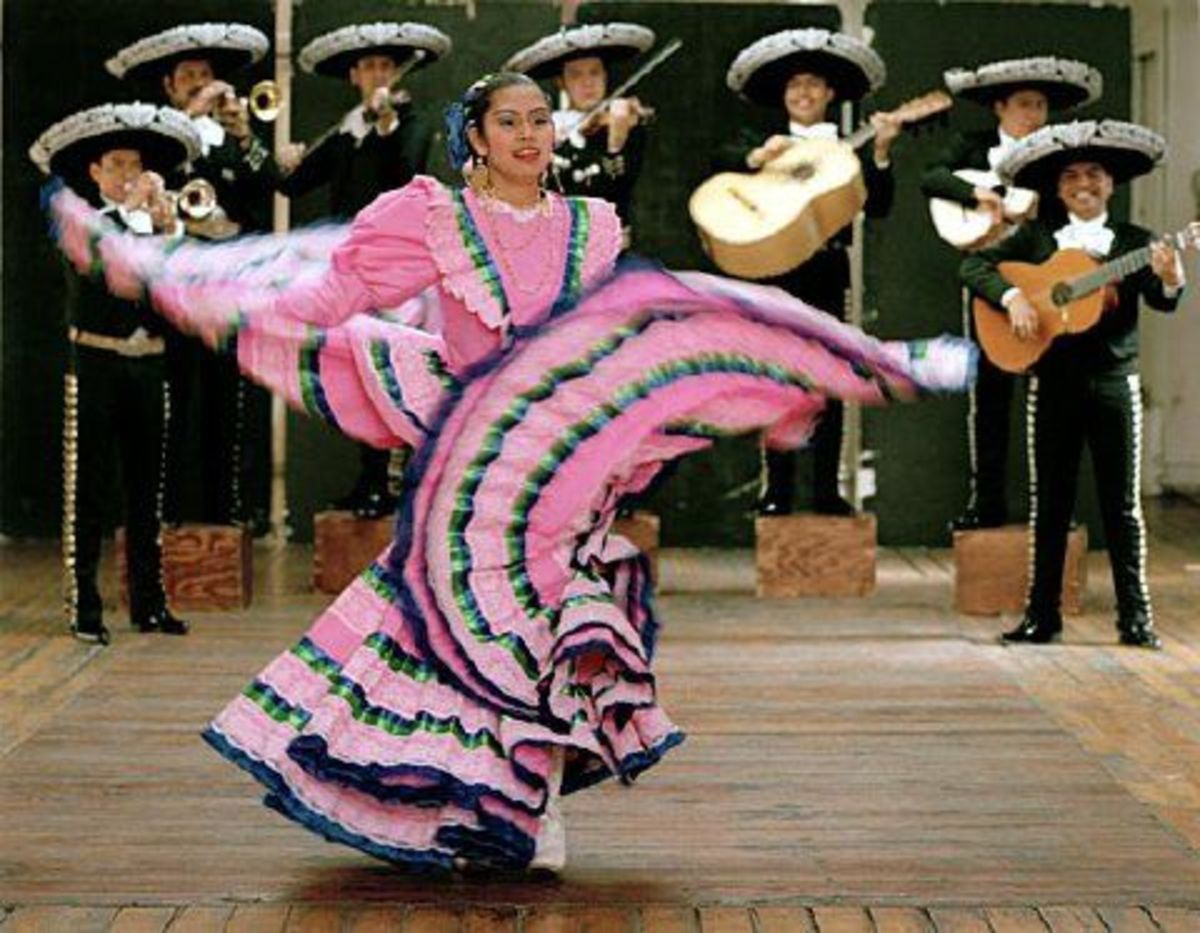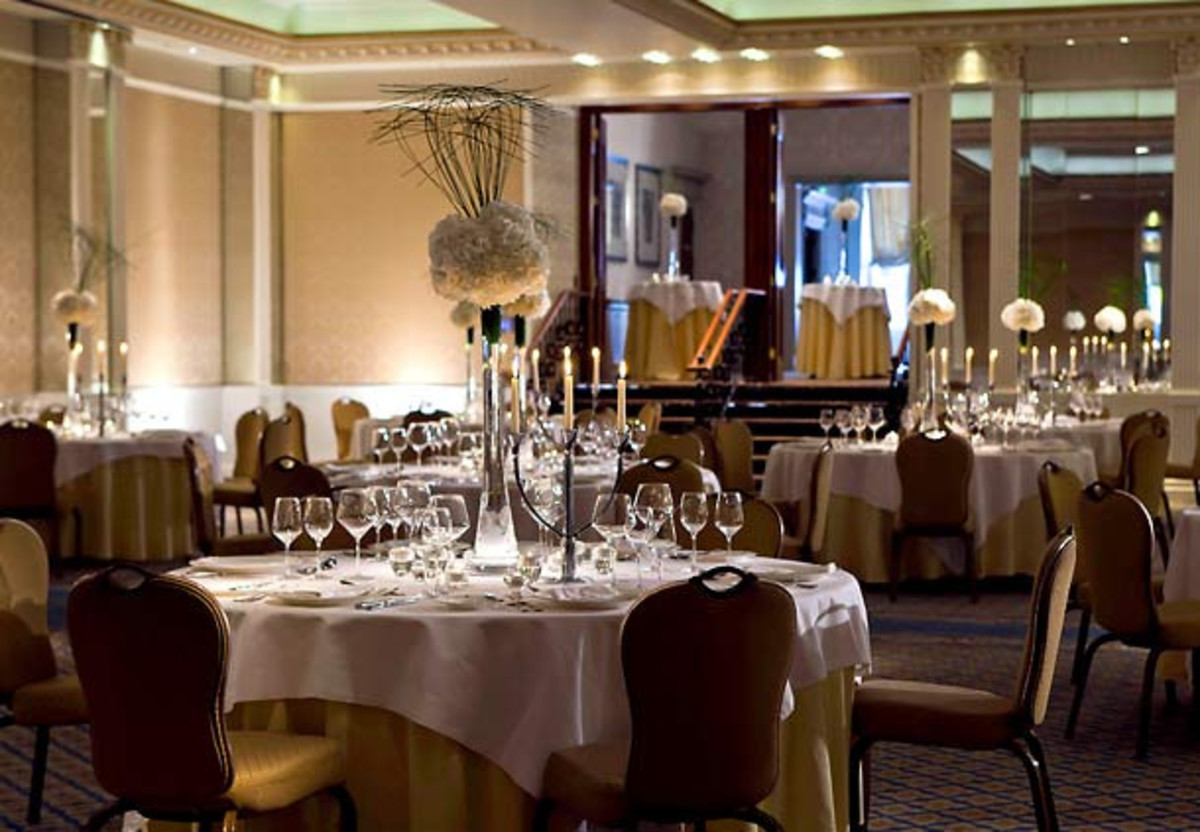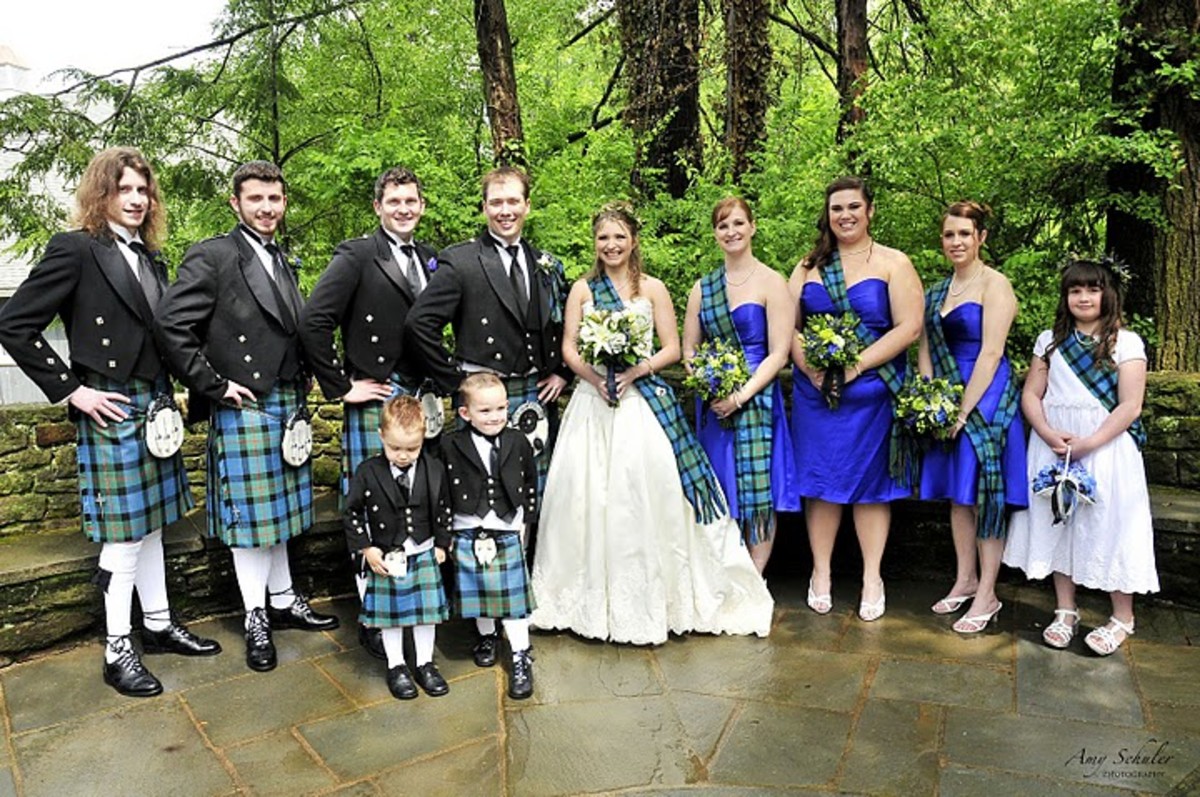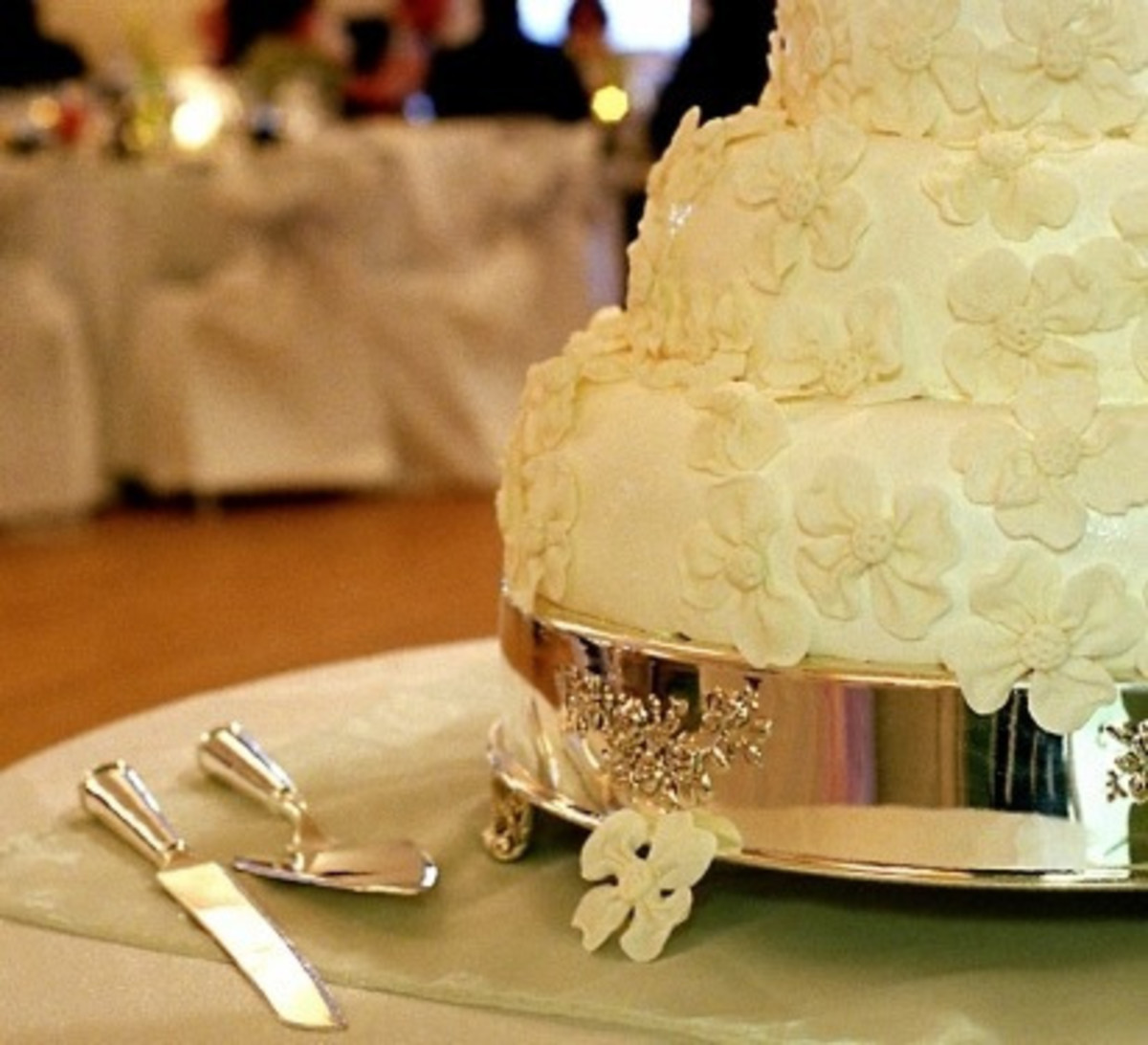Wedding Music Vendors and What They Each Provide
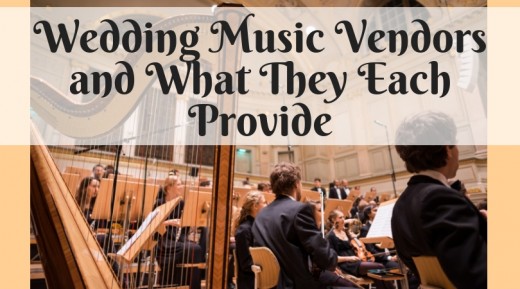
Some brides dream of having a choir singing in the background as they walk down the aisle, and others dream of having a single musician playing the piano, playing a guitar, or even playing a harp or violin. And what about the reception? Many couples choose to go with a band for their wedding music, where others would love to have a trio playing lightly in the background. What most couples go for though, usually because of pricing and availability, is a disc jockey, or DJ.
Depending on the wedding entertainment chosen, every couple can have a truly unique wedding experience created by any one of these music options. Every one of these vendors will create an entirely different atmosphere, and provide a variety of different products and services.
For instance, while DJs can provide exciting lighting effects and loud motivating music to keep guests dancing all night, a choir is great for getting people on their feet to sing and clap their hands, and an orchestra is more appropriate for more formal dancing and beautiful background music.
You can almost see the completely different weddings by considering the services they offer. Think of the three piece suits and fancy dresses dancing at the wedding with an orchestra playing for them, and the jeans and t-shirts jumping up and down to the loud music played by a popular band. As you read, think about what would suit you and your fiance' best. Let's take a closer look at each musical option available to you.
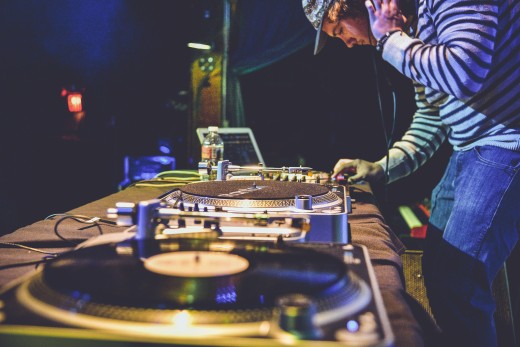
DJs
A DJ can be the life of the party, getting everyone engaged, or can ruin the mood of a reception (anyone remember the YouTube video of the drunk DJ?). Disc Jockeys are an excellent option to provide recorded music for both your ceremony and reception.
- Consultation - Every DJ will want to meet with potential customers before any contacts are signed. With the DJ you will likely discuss time and location of the wedding, what services the bride and groom need for the wedding, and what they really want from the DJ. Some DJs charge for this initial consultation, but most of then do not.
- Speakers - Active speakers, passive speakers, PA speakers, amplifiers, subwoofers . . . obviously this isn't information couples need to know specifics about, but DJs will sometimes offer their customers a variety of speaker options in case they have different sound needs, or are a little more savvy equipment-wise.
- Sound System - DJs at each price point are going to have different levels of sound systems to play music for their customers, along with different equipment to provide the sounds they are looking for with that sound system. As these considerations are already worked into the price of their services (fancier equipment will likely cost the customer more and vice versa), there should be no extra fee. This simply means each DJ will be providing music in a slightly different way, and this might make a difference for customers. (If the customer needs their DJ to have a CD player or the ability to use a thumb drive, and the DJ they're looking at doesn't provide what they need, the customer needs to take that into consideration.)
- CD Player and CDs - Whereas many DJs have all of their music in digital format, and play all of the wedding music from their computers, some still have all of their music on CDs. It also comes in handy for them to have a CD player for any discs couples might bring with their own music on them.
- Turn tables - When you think about night clubs, alcohol, and dancing, you can almost hear the scratching, mixing, and musical talent of DJs therein. Turn tables are essentially record players attached to a computer that allow DJs to really express themselves and use their talents to keep everyone excited. Not every wedding DJ will have turn tables for weddings. They are much more common in night club scenarios.
- Lighting - From strobe lights, to colorful dance floor lights, to spot lights and more, DJs, depending on their expertise and stock of lighting products, will have a variety of different lights and lighting effects to offer their couples. Traditionally lighting would be rented from a lighting company, but sometimes this vendor offers then as well. Many DJs charge for extra lighting and effects (color options, disco lights, and other light effects).
- Dance floor or wall light display - If you've ever seen a picture, a couple's name, or even a monogram in light displayed on the wall, ceiling, or dance floor, you've seen what I'm talking about. Once again, these effects are usually rented from a lighting company, but sometimes DJs will offer this service for a fee as well.

- Fog machine - A fog machine is a machine that puts out a heavy smoke that settles to the ground and creates a magical effect. Many if these use dry ice or other methods. When renting a fog machine, these will come at an extra cost.
- Sound engineer - This is simply an additional "DJ" to give the first DJ a break, help with moving equipment, assist the DJ with any thing needed, and even help spin discs. This extra person always comes at an additional charge.
- Microphone(s) - Many DJs do not offer microphones as part of their packages, but these really come in handy at weddings. A corded microphone is perfect for the DJ that is also going to be the emcee for the evening. Everyone will clearly be able to hear him or her from anywhere in the room. A wireless microphone is great for toasts. The mic can be passed around as members of the guest list give the couple their good wishes. Finally, a small wireless mini-mic is also priceless to put on the wedding officiant. This way all of the guests there at the ceremony can clearly hear what is going on at the front of the room.
- iPod hookup - With CDs quickly going out of style, and more couples downloading their preferred music to a list, or even giving their DJ a list of their music for him or her to download for them, it is essential for DJs to be able to play digital music, or they will quickly be left behind in the industry. This option allows the wedding couple to simply transfer all of their music to a thumb drive to hand over on the wedding day. The DJ can simply plug in the thumb drive and have ready access to all needed music.
- Professional Emcee - The "MC" at a wedding essentially makes all of the announcements. He or she will dictate the schedule by announcing the cocktail hour, start time for dinner, bride and groom's entrance, first dance, etc. Someone will need to do this, and sometimes it falls on the wedding planner. As the DJ has a microphone and speakers, he or she can make this job much easier.
- Online Planning Forms - During the wedding planning process, this vendor will need tons of information from the customer including a schedule of the songs they want played at certain times during the wedding day, a schedule of the wedding day outlining when the DJ will need to show up and when they can leave, a list of songs that should not be played, and more. Sometimes DJs will offer online planning forms to help their brides and grooms with turning in all of the right information.
- Projector and Screens - A projector is the computer that projects the images programmed, and the screen allows the pictures to be displayed so guests can see them clearly. A screen is not always necessary as the pictures can also be displayed against a blank wall, on the floor, the ceiling, or anywhere where there's a blank canvas for guests to view the images being displayed.
Obviously these may not be all that DJs have to offer all over the country and all over the world, but this is a pretty comprehensive list of products and services. Let's check out what some of the other music vendors have to offer their customers.

Bands
A basic dance band begins with a keyboard, bass and percussion. A five-piece band might add an electric guitar and saxophone, and is a good starting size for a typical wedding. Additional instruments may be added depending on the style of music that the band plays.
Some bands specialize in one type of music; others are able to play a variety of musical styles, from swing to soft rock, rhythm and blues to disco. If you want a "big band" sound, expect six to seven band members at least. A big band with a full brass section can have up to thirteen horn players.
- Vocalists – Bands provide an option that many other music options do not, that of vocalists available for the performance. Not all bands, but many will provide at least 1 or 2 individuals singing in the band.
- Talented musicians – Most of those playing in a band have a great deal of experience in the music industry. Very few bands that advertise for weddings will be comprised of individuals with no prior experience, if any.
- Choreography – Live music is great at any event, and really gets people up and excited, but some bands will take their entertaining to the next level. Many bands will not only provide music for wedding guests, but will also be creatively choreographed, dancing and/or moving up on stage together to get everyone else moving.
- Costume changes – If this is an interest of the bride and groom, many bands will bring several costume changes to change it up during the wedding.
- Different themes of music – It is fairly easy to find bands that will play just about any style of music that can be imagined (jazz, blues, pop, rock and roll, etc.) However, some will mix it up and play 2, 3,4 or more different styles throughout the event if requested.
- Play requested music – Not all bands, but some of the most talented will be willing to play requested music. As this takes real talent, a real knowledge and experience in their individual instruments, and coordination with the other band members, many are not able to do this.
- Anywhere from 2 to 8 members – Bands can be comprised of anywhere from 2 to 8 members or more. Most will be around 4-5 people total.
- Scheduling - For speeches, toasts and other important moments, the bandleader will likely help by lowering the volume of the music, getting the guests' attention, and introducing the speaker. They may even make all other announcements (like the beginning of dinner and the cake cutting) at the wedding keeping the wedding moving on track and using their music to keep the excitement and energy up throughout the event.
When searching for the right band, try to avoid "assembled bands." These bands are where the members don't play together regularly. Most companies offer a variety of talented musicians with their own individual instruments, and them simply assemble them in different combinations for each event when they are hired. Not being familiar with each other, each other instrument, or working together as a group, chances are they will stop between each song to discuss details, cues, songs, and getting started on the next number. By that time, the momentum of the music will be lost. This leaves the music sounding chopping and the band sounding hesitant, rather than being the talented musicians they were hired to be.

Some bands also invite a number of friends, assistants, and family members to weddings where they are performing to watch them play. This is not normal, and not appropriate. If they would like to perform for their family and friends, they can do this at another time.
It is smart to specify exactly who and how many people from the band will be allowed to attend the wedding, along with what they should wear, when they should arrive, starting and ending times with breaks included, when they can eat and drink, whether or not they are permitted to smoke, and so on to avoid any misunderstandings on the wedding day. All of this information should be written out in detail, to the consensus of both parties, in the contract before any services begin and any money is exchanged.
Finally, some companies will invite prospective clients, who are considering hiring the same band for a later date, to drop by your wedding to watch the band perform. Once again, this is inappropriate. If a couple wants to view the band at work, it should definitely be at a more public event, and not a private one like a wedding. Nobody should be "inviting" any one to the wedding except the two people getting married. This is not the right time for any wedding vendor to be worried about future sales. This goes for passing out business cards as well. If one of the guests really likes one of the wedding vendors, they can easily get their information from the bride and groom after the honeymoon.
If you have any concerns that any of the above warnings might be a concern, discuss these with the vendor ahead of time to express them and get any misunderstandings worked out before the wedding day. Most of the time, there is nothing to seriously worry about as long as you take the time to do your research and ask any and all questions that come to mind. Just be aware of these few of these warnings, and you should be fine.
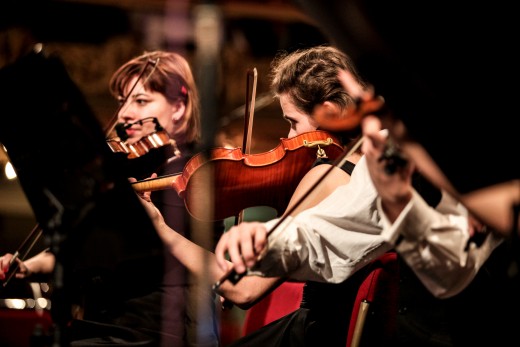
Orchestras
There is nothing more beautiful than a harpist playing “Here Comes the Bride” as the bride walks down the aisle. Or what about live musicians at the reception playing the latest hits? In my opinion, live music adds a special something to the festivities that recorded music simply cannot match.
- Offer solos, duets, trios, quarters, and quintets - Many orchestras are capable or teaming up into different groups of different sizes for a variety of events. They will provide solos, duets, trios, quartets, quintets, etc. for any event when asked.
- Split into parts during event – These talented musicians will also do the same thing during an event, providing a solo or duet during the wedding ceremony, a trio for the cocktail hour, a quintet for dinnertime, and finally the whole 40 piece orchestra for the rest of the evening.
- Play any music you choose – As an orchestra is most likely very experienced with playing together and in separate groups. They will likely play any music that they are asked (especially if they have practice time for the more difficult pieces requested).
- Any mixture of instruments - As an orchestra has musicians using a wide variety of instruments, they have an assortment of instruments to choose from for wedding performances.
- Vocalists - Instruments are not the only music options to choose from either. They also have many talented vocalists that would be excited to sing for a wedding by themselves, or alongside instruments.
Quick Quiz
view quiz statistics- 1 to 40 musicians - Orchestras can provide talented musicians in any number for events. Solos, duets, trios, quartets, quintets, and even the whole 40 piece orchestra can come and perform, even all on the same day.
- Principal Conductor - The conductor of an orchestra unify performers, set the tempo, execute clear preparations and beats, and to listen critically and shape the sound of the ensemble.
- Leader - There is a "leader" of each individual section essentially; violins, cellos, etc. which is called the first chair and second chair. He or she keeps everyone in their section on the right track, in harmony with the music.
- Sound and light tech - A sound and light technician will make sure any speakers, sound systems, lights, or other services that the orchestra provides are working correctly throughout all events to make the musicians look and sounds their best for customers.
- Formal attire - One great benefit of using orchestra services for a wedding, is that they will always show up dressed to the nines.
- Conducting classes - For those interested in learning to conduct themselves, many orchestras provide classes to teach individuals to conduct an orchestra themselves.
- Rentals - Orchestras also offer many rental services such as lighting, staging, sound, light effects, light picture for wall or dance floor, microphones, wireless microphones, screen and projectors, emcee service, DJ service for breaks, and/or a PA system.

Church Choirs
The more time passes, the more talented these groups are becoming, and therefore they are singing for more events, and are beginning to offer more services to those wishing to hire them. A choir can be just as beautiful, if not more, than other music options if chosen correctly. However, this is definitely an option for those that know what they are looking for. Let's look at some of the services they are offering besides the beautiful music they make.
- Choir Director - This person essentially serves the same position as an orchestra conductor. He or she leads the choir so they stay on beat and know what's coming next.
- Organist - Choirs typically come with an organist to play background music for them, but this person will come at an extra cost if there is a request for them to show up at an event.
- 1 to 100 singers - Church choirs come in so many different sizes, and most of them will perform at events in a variety of sizes as well. Choirs are now performing as solos, duos, trios, etc. as well as performing as a whole.
- Church hymns - Hymns go with church choirs like peanut butter and jelly. These are definitely the right people to hire to hear some great hymns at a wedding.
- Music books of music - For those couples that need some help choosing music, church choirs typically keep books of music that they normally sing that couples can look through.
- Taylor music to requests - These choirs will also sing requested songs at weddings as long as they get the music far enough ahead of time for the choir to practice.
- Lead group singing - If a couple would like their guests to be led in singing hymns or other songs during the wedding, church choirs can provide that service.
- PA System - In order to make sure they sounds the best for their performance, sound systems are usually offered for rent at a small fee.
- Provide readers - Weddings in churches typically have people come to the front to read scriptures, meaningful sayings, poetry and other beautiful words. Sometimes church choirs will provide these people for weddings if they are requested.
__________________________________________________________________
For all live music options, like those described below, some services will be consistent, such as:
1. Your dedicated wedding entertainment consultant, who will meet with you regularly to ensure that you get the music you want, the way you want it.
2. A state-of-the-art PA system, individually tailored lighting rig and industry expert sound and lighting engineers.
3. A wireless microphone to use for speeches.
4. The opportunity to make song requests to be played live by your chosen act, including Bridal Waltz, Entrance Songs, Processional/Recessionals and Farewell Songs.
5. Act guaranteed to be set-up and sound-checked hours prior to guest arrival.
Let's look at the benefits of each option.
__________________________________________________________________
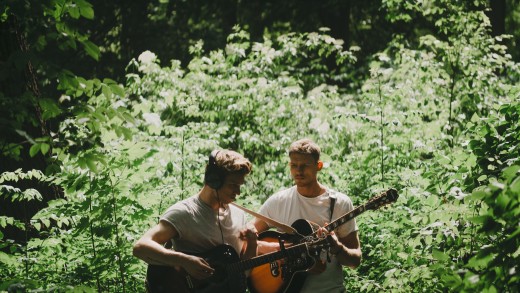
Duets
A guitar and vocal duo is the most popular option for more recent wedding ceremonies, especially for a more relaxed vibe and more contemporary songs. Duos can perform from a large repertoire of well-known pop, acoustic, groove, rock and even indie favorites. Especially if wedding guests are on the younger side, this choice would be perfect as the audience will connect with the musicians and relate to the music.
There are so many different types of duets to consider. Just about any instruments can be combined to create a unique and eclectic sound that would be perfect for any wedding. A guitar and flute duo creates a delightful blend of tone colors. The sound of the guitar is highlighted by the melodic character of the flute, thus creating a unique sound that can be easily heard yet is never overpowering. (A Jazz Trio)
Among others, a string duet can be one of many combinations: violin/flute, two violins, violin/harp, violin/cello, or violin/piano (organ). The first three give a lighter and transparent melody and harmony, the others a melody and bass sound. If the duo is performing with electric guitar or keyboard, they will require a power source for their instruments, which can be problematic for some garden ceremonies. (Corda Entertainment)
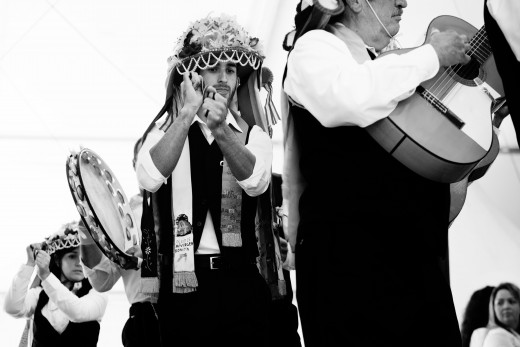
Trios or Quartets
Trio:
It may seem an odd suggestion, but for an interesting and unique sound, why not have a Latin trio perform? A Latin trio will inspire a fun and light-hearted atmosphere for any celebration, is guaranteed to entertain a wide variety of guests of different ages, and should have guests tapping their feet before the reception has even started. A trio combining strings with the flute is one of the most popular musical ensembles with this type of group. This popular combination is ideally suited to recreating traditional elegance of composers from classical to Viennese to more popular music.
Keep in mind, a trio can be made from just about any combination of instruments. It doesn’t have to be strings with a flute. Consider also, a guitar, a harp, and a violin, or an oboe, a cello, and an organ. The options are endless. It helps if you can find a group that is used to working together with the combination of instruments requested. It is risky to hire separate musicians not already used to working together.
Quartet:
Versatile and expressive, a string quartet remains a popular choice for wedding ceremony music. Suitable for both religious and non-religious ceremonies, string quartets can perform from a large repertoire of classical and popular songs, and it is common for them to accept song requests from the wedding couple (as long as they are given enough notice). They also add a fantastic visual element to the occasion, stimulating an atmosphere of classic elegance. If the string quartet is being asked to perform outdoors for a wedding ceremony or reception, they will need a cover or shade, as sunlight (or rain!) will damage their instruments.
Consisting of flute, oboe, clarinet and bassoon, a wind quartet can perform the usual ceremony repertoire with a unique twist. Able to draw upon similar song list to a string quartet, a wind quartet will resonate well in a large space, and are able to perform outdoors without any problems (other than needing some cover for the weather). A wind quartet will add a romantic, lilting touch to any wedding. Sourcing a wind quartet can prove to be challenging though. Remember to make sure that any musicians you hire have a good deal of experience working together with these instruments. (Funkified Entertainment)
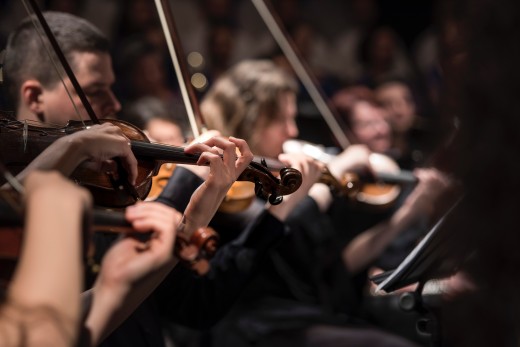
Quintets
The string quintet offers the full sound of the quartet plus a standup bass to add more depth to the sound. This is a great idea for the wedding that is outdoors in a wide open area or a large ballroom where the sound needs to travel. For an added touch, a trumpet is a great addition to any string group. A trumpet fanfare before the bridal entrance adds a grand announcement and will surely capture the audience's attention. The trumpet can also be utilized during the prelude and recessional music as well.
The brass quintet, comprised of two trumpets, tuba, trombone and French horn, makes for a majestic event. For the grandest of affairs, trying combining the brass quintet alongside the string quartet for a magical sound.
Good (singing) a cappella (many “with no instruments or music”) ensembles have the added positive of allowing for songs with great lyrics, not just melodies. This can open up an entire range of options based on the words as well as the music. If possible, make sure you see the group first, or at least hear a recording. There are many amateur (and sometimes out-of-tune!) vocal ensembles out there, of whom you will want to avoid at all costs.
If the bride or groom has Irish or Celtic roots, and would like to play homage to them, Irish pipe musicians are even a great option to consider. Irish pipe players play from a range of traditional and more modern Celtic songs and ballads. This instrument is wonderful in its ability to play more than one melodic line – but it’s important to make sure to find an experienced piper. Bad Irish pipe playing is very possible, and very unfortunate.

Single Musicians
Hiring a harpist for the wedding ceremony is another more traditional option. If you are planning a more romantic wedding, a harpist will be ideal, as they exude romance both musically and visually. However, the repertoire of a harpist is far more limited than other options, as they have a narrower range of sound and expression. They also have quite a soft dynamic, so are more suited to intimate ceremonies. If the wedding is outdoors, the harpist will require shade or cover to avoid damage to their instrument from the heat or possible bad.
A solo violin or guitarist is also a great option for a small, simple and elegant wedding. A strolling violinist would also be a creative idea so guests can make their own song requests throughout the event. There are so many options for a single musician. This can be anything from a single vocalist, to an organist, a flautist, or even a bass player. There’s no reason any musician of preference cannot play alone for any event.
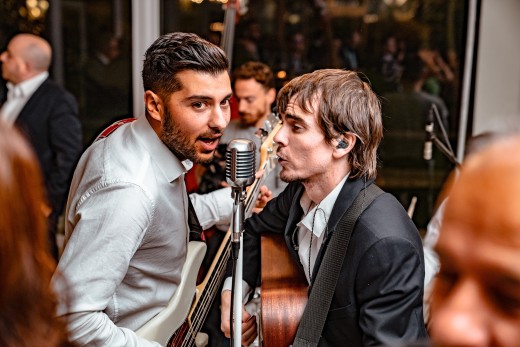
I'm positive that whatever kind of music you choose for your big day, it's going to be fabulous. Just make sure that you check references and go see them in action if possible before your wedding day. I've been there when the vendor can't deliver on their promises, or they're caught running out of their free trial for their music program right in the middle of your wedding.
Pick out music that you love that makes you feel the way you want to feel on your big day, and don't hesitate to give your music vendor a very specific schedule of what to play at what times during your ceremony and reception. In fact, it will make their jobs that much easier and you won't have to worry about bad music, dead time, or anything offensive.
I think this is one of the most fun parts of the wedding planning process. Music really affects the emotions and moods of people, and you have a chance to set the specific mood you want to be in the entire day of your wedding. Why not fill it with all of your absolute favorite music? Enjoy!
© 2013 Victoria Van Ness

